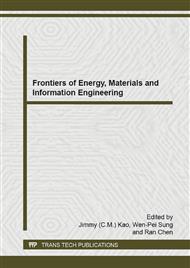[1]
Hui-ling SU. Theory and actual example study of reliability of generation system [D]. Nanchang University (in China), (2007).
Google Scholar
[2]
Jing WANG, Fang WANG, Jie PAN, et al. Application of total probability formula in power generation system reliability evaluation [J]. Power System Protection and Control (in Chinese), 2009, 19: 69-72 +76.
Google Scholar
[3]
Billinton R, Allan R N. Reliability assessment of large electric power systems. Boston: Kluwer Academic Publishers, (1988).
Google Scholar
[4]
Ze-fu JIANG, Kai-gui XIE, Bo HU, et al. Wind power generation analytical model for the reliability evaluation of power systems [J]. Power System Protection and Control (in Chinese), 2012, 21: 52-57+95.
Google Scholar
[5]
Billiton R, Allan R N. Reliability evaluation of power systems. London: Pitman Advanced Publishing program, (1984).
Google Scholar
[6]
Liang X, Goeil. Distribution system reliability evaluation using the MonteCarlo simulation method [J]. Electric power system research, 1997, 40(2): 75-83.
DOI: 10.1016/s0378-7796(96)01104-2
Google Scholar
[7]
Wei-bin MAI. Research on power demand side management under the smart grid in Zhaoqing [D]. South China University of Technology (in China), (2012).
Google Scholar
[8]
OuY, Goeil. Using MonteCalro simulation for overall distributionsystem reliability worth assessment [J]. IEE Proceedings: Generation, transmission and distribution, 1999, 146(5): 535-540.
DOI: 10.1049/ip-gtd:19990542
Google Scholar
[9]
Roy Bilhnton, Peng wang. Teaching distribution systems reliability evaluation using Montecarlo simulation. IEEE Transaction on power System, 1999, 14(2): 397-403.
DOI: 10.1109/59.761856
Google Scholar
[10]
Jian-yong CHEN, Hong-mei CAI, Hao-yi SU. Application of blind number theory in power generation system reliability evaluation [J]. Power System Protection and Control (in Chinese), 2012, 13: 74-77+83.
Google Scholar
[11]
L, GOEL. Montecarlo simulation based reliability studies of a distribution test system. Electric Power System Research. 53(2000)55-65.
DOI: 10.1016/s0378-7796(99)00066-8
Google Scholar
[12]
Yi-bin GUAN, Cui-yu ZHAO. Influence analysis of implementing DSM technology on system's reliability [J]. Electric Power Automation Equipment (in Chinese), 2003, 09: 63-66.
Google Scholar
[13]
Peng ZHANG. Study on demand side management on power system reliability [D]. North China Electric Power University (Hebei Province in China), (2006).
Google Scholar
[14]
Yu ZHOU, Ru-yue HAN, Ke-ke CHEN. Effect of demand elasticity on generation system reliability [J]. Power Demand Side Management (in Chinese), 2006, 03: 19-21.
Google Scholar
[15]
Chem Lin Chen, Jiann Liang Ches. A neura1. Network approach for evolution distribution system reliability [J]. Electric power system research, 1993, (26): 225-229.
Google Scholar
[16]
Ru WEI. User power supply reliability assessment and prediction in low-voltage distribution system [D]. Shanghai Jiao Tong University (in China), (2013).
Google Scholar
[17]
Bo ZHONG, Yuan ZHAO, Jia-qi ZHOU. Methods of power systems reliability assessment based on rough neural network [J]. Journal of Chongqing University (Natural Science Edition) (in Chinese), 2005, 28(7): 38-42.
Google Scholar
[18]
Lin XIE, Kai-gui XIE, Jian HE, et al. Reliability evaluation of grid-connected micro-grid considering control strategies [J]. Power System Protection and Control (in Chinese), 2013, 15: 102-109.
Google Scholar
[19]
Lin XIE. Reliability evaluation of microgrid considering energy storage and control strategies [D]. Chongqing University (in China), May, (2013).
Google Scholar
[20]
Long-jun WANG. Research on reliability evaluation approach of power grid and reliability basic theory [D]. South China University of Technology (in China), Dec. (2010).
Google Scholar
[21]
Jun-feng WANG, Jia-qi ZHOU, Kai-gui XIE. Fuzzy reliability evaluation algorithm for medium voltage distribution networks [J]. Journal of Chongqing University (Natural Science Edition) (in Chinese), 2006, 29(2): 45-49.
Google Scholar
[22]
Yin GUO. Probability distributions calculation for bulk power system reliability considering parameter uncertainty [D]. Chongqing University (in China), May, (2013).
Google Scholar
[23]
Guang-rui XU. The study of the reliability test system of DC electromagnetic relay [D]. Harbin Engineering University (in China), Mar. (2013).
Google Scholar
[24]
Xu HUANG. Research on power grid reliability evaluation model incorporating asynchronous generators [D]. Chongqing University (in China), Mar. (2012).
Google Scholar
[25]
Yu-dun LI. Wind speed models considering dependence and their applications in reliability evaluation of generating systems [D]. Chongqing University (in China), Mar. (2012).
Google Scholar
[26]
Yuan ZHAO. Research on reliability assessment of bulk power systems based on sensitivity analysis and a corrective model [D]. Chongqing University (in China), May, (2004).
Google Scholar
[27]
Zhi-long QIN. Reliability assessment of power systems with wind farms and photovoltaic power stations considering correlations [D]. Chongqing University (in China), Apr. (2013).
Google Scholar
[28]
Wen JIANG. Research on reliability and dynamic economic dispatch of power system considering wind power [D]. Shanghai Jiao Tong University (in China), Jan. (2012).
Google Scholar
[29]
Xin-yuan WANG, Rui-peng GUO. Reliability assessment of power system with large-scale wind power integration considering load uncertainty [J]. East China Electric Power, 2013, 02: 385-389.
Google Scholar
[30]
Chao WANG. Research on several important issues in power system reliability assessment [D]. Zhejiang University (in China), Sep. (2007).
Google Scholar
[31]
Xiao-tong SONG. Study on reliability evaluation of power system based on Monte Carlo simulation [D]. Shandong University (in China), Apr. (2008).
Google Scholar
[32]
Jiang-ning HUANG. The study o algorithms for power system reliability evalluation based on Monte Carlo simulation [D]. Zhejiang University (in China), Jan. (2013).
Google Scholar
[33]
Yong-shuai ZHAO. Distribution network reliability evaluation model study incorporating distributed generators [D]. School of Electrical Engineering of Chongqing University (in China), May, (2013).
Google Scholar


